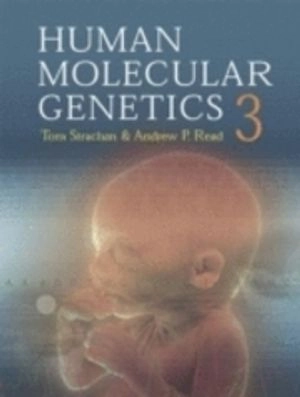Now in its third edition, Human Molecular Genetics continues to provide authoritative guidance on the principles underlying human molecular genetics. The content and organisation has been comprehensively updated.
Professors Tom Strachan & Andrew Read awarded the Education Award 2007 of the ESHG for their outstanding contribution to the dispersal of knowledge of modern human molecular genetics among students and professionals.
Following the completion of the Human Genome Project the content and organization of the third edition of Human Molecular Genetics has been thoroughly revised.
* Part One (Chapters 1-7) covers basic material on DNA structure and function, chromosomes, cells and development, pedigree analysis and the basic techniques used in the laboratory.
* Part Two (Chapters 8-12) discusses the various genome sequencing projects and the insights they provide into the organisation, expression, variation and evolution of our genome.
* Part Three (Chapters 13-18) focuses on mapping, identifying and diagnosing the genetic causes of mendelian and complex diseases and cancer.
* Part Four (Chapters 19-21) looks at the wider horizons of functional genomics, proteomics, bioinformatics, animal models and therapy.
There are new chapters on cells and development and on functional genomics. The sections on complex diseases have been completely rewritten and reorganized, as has the chapter on Genome Projects. Other changes include a new section on molecular phylogenetics (Chapter 12) and the introduction of 'Ethics Boxes' to discuss some of the implications of the new knowledge. Virtually every page has been revised and updated to take account of the stunning developments of the past four years since the publication of the last edition of Human Molecular Genetics.
Features:
* Integration of Human Genome Project data throughout the book
* Two new chapters 'Cells and Development' (Chapter 3) and 'Beyond the Genome Project: Functional Genomics, Proteomics and Bioinformatics' (Chapter 19)
* Completely rewritten and reorganised coverage of complex disease genetics
* Increased emphasis on gene function and on applications of genetic knowledge, including ethical issues
* More prominence given to novel approaches to treating disease, such as cell-based therapies, pharmacogenomics, and personalised medicine
* Special topic boxes that include detailed coverage of ethical, legal and social issues, including eugenics, genetic testing and discrimination, germ-line gene therapy and genetic enhancement, and human cloning
* Contains two indices: a general index and one that contains names of diseases and disorders
Åtkomstkoder och digitalt tilläggsmaterial garanteras inte med begagnade böcker





















